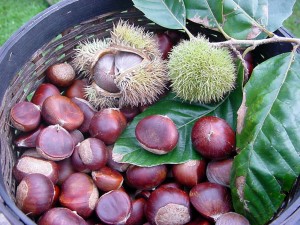Chestnuts roasting on an open market (American Lorain)
I may be in the minority among the financial community and the public, but I do not assign any mystical economic or investing qualities to China or any of the companies in it. There was a similar hysteria in the 80s over Japan, and we all recall how that ended. I find it similarly unlikely that China has discovered how to repeal the ordinary rules of economics. Furthermore, although I have no direct proof of it, I suspect that the astounding growth figures in China are exaggerated, considering that they are still reporting high GDP growth in the face of articles from earlier this year about exports dropping and migrant laborers going home.
However, these sentiments should certainly not disqualify a Chinese company from consideration for investment; Warren Buffett (and presumably other investors as well) noticed that South Korea sits in the shadow of North Korea’s missiles and its accounting rules make Japan’s look like a model of transparency. This resulted in a number of stocks drifting around to a P/E ratio of 3. But, with careful analysis, it became clear that among the mess a few of those stocks were legitimately offering those kinds of P/E ratios.
 American Lorain (ALN on the Amex), sadly, doesn’t have a P/E ratio of 3. But it is 5.26 as of this writing, which is not bad. It is an American-registered firm that, through a multi-tiered capital structure, owns four operating subsidiaries in China, one of which is shared 80:20 with the Chinese government. They produce a wide variety of chestnut products and other processed foods in a number of markets, primarily China, but including the rest of East Asia and various other nations. Although they claim to control various proprietary technologies including a method for permeating a chestnut with syrup without altering its texture, I don’t believe that they are blessed with any sort of durable competitive advantage, although they claim to be the largest chestnut processor in China. Operations-wise, they seem to be fairly dependent on bank debt, and based on their SEC filings short-term interest rates in China are surprisingly high; between 5 and 10% for their various short-term borrowings, which they have expanded considerably in anticipation of the third and fourth quarters when they see their highest demand. Their balance sheet does also count more than $2 million worth of “landscaping, plant and tree†as an asset, which seems like kind of a stretch.
American Lorain (ALN on the Amex), sadly, doesn’t have a P/E ratio of 3. But it is 5.26 as of this writing, which is not bad. It is an American-registered firm that, through a multi-tiered capital structure, owns four operating subsidiaries in China, one of which is shared 80:20 with the Chinese government. They produce a wide variety of chestnut products and other processed foods in a number of markets, primarily China, but including the rest of East Asia and various other nations. Although they claim to control various proprietary technologies including a method for permeating a chestnut with syrup without altering its texture, I don’t believe that they are blessed with any sort of durable competitive advantage, although they claim to be the largest chestnut processor in China. Operations-wise, they seem to be fairly dependent on bank debt, and based on their SEC filings short-term interest rates in China are surprisingly high; between 5 and 10% for their various short-term borrowings, which they have expanded considerably in anticipation of the third and fourth quarters when they see their highest demand. Their balance sheet does also count more than $2 million worth of “landscaping, plant and tree†as an asset, which seems like kind of a stretch.
The company also does not have a long operating history, having only been in operation in its current form for a couple of years since its effective IPO and having only been listed on an exchange since last September, although the actual business has been in operation since 1994. They have also had issues with getting their SEC filings in on time.
At any rate, if any of you have an appetite for investing in China, American Lorain is a suitable candidate; it is a firm in a relatively stable industry, with reasonable growth potential, that is manifestly underpriced both in terms of P/E ratio and return on equity, even without consideration of any supposed China premium. I don’t necessarily believe in international equity and currency exposure just for the sake of having the exposure, but international underpriced exposure is a different matter entirely.
Leave a Reply